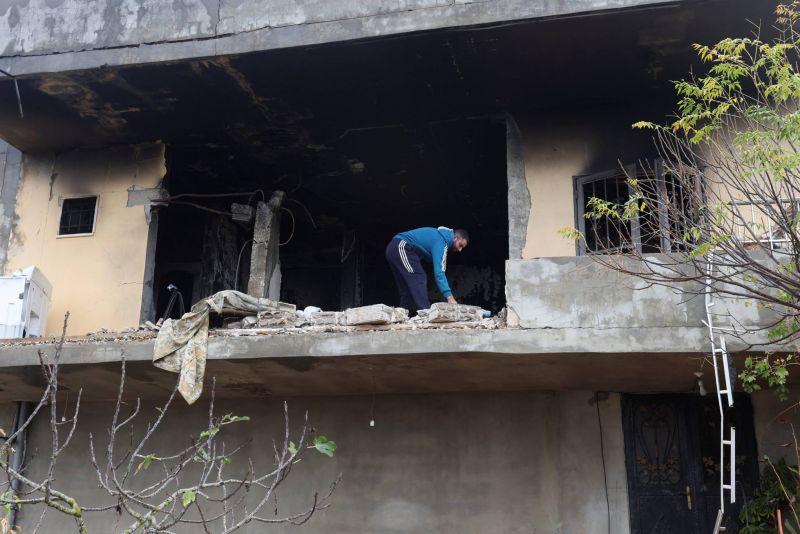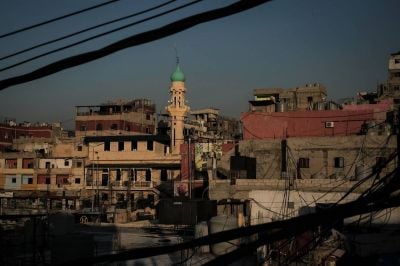
Hady Jaber stands at a house that was damaged during Israeli shelling in recent weeks, prior to a truce taking hold between Hamas and Israel, that has informally extended to southern Lebanon, in Mhaibib village, near the border with Israel, southern Lebanon Nov. 28, 2023. (Credit: Aziz Taher/Reuters)
During a Monday event, Hezbollah MP Hassan Fadlallah announced that the party will compensate residents of southern border villages that have been “directly affected” by the fighting with Israel over the past seven weeks.
According to Fadlallah, Hezbollah’s engineers have already begun assessing the damage to residents' homes and livelihoods in South Lebanon so Hezbollah provides “as many resources as possible.”
One of these resources will likely be Hezbollah’s Jihad al-Bina (مؤسسة جهاد البناء الإنمائية; "Construction Efforts") Foundation, though the party has not officially announced this. Jihad al-Binahas regularly plays a central role in Hezbollah’s efforts to support its constituency in southern Lebanon, Bekaa and Beirut’s southern suburbs.
Hezbollah’s construction wing
Jihad al-Bina was founded in the early 1980s, nearly the same time as Hezbollah's own origins. According to Nicholas Blanford, a non-resident senior fellow at the Atlantic Council’s Rafik Hariri Center, the foundation was a means of providing social services to Shiite communities in the absence of a functioning state, which had been fractured by the start of the civil war in 1975.
Initially, Jihad al-Bina worked as a waste management company — cleaning up garbage and the aftermath of explosions in Beirut’s southern suburbs — but its role evolved in the 1990s as Hezbollah’s war against the Israeli occupation in South Lebanon intensified.
“Whenever there was a flareup of fighting, the Israeli artillery shells caused damage to somebody’s house, the Jihad al-Bina guys would be around there the next day assessing the damage and patching up the repair work long before the Lebanese government would send in their own people to do the same thing,” Blanford told L’Orient Today.
After the end of the Israeli occupation in May 2000, Jihad al-Bina’s role expanded even further.
Kassem Kassir, an analyst close to Hezbollah, explained to L’Orient Today that, in addition to repairing damage by Israeli attacks, Jihad al-Bina now also sponsors the “development and agricultural sectors,” through its construction projects.
“There are training courses and support for agriculture,” Kassir said.
Cash or construction
Residents affected by Israeli bombings are often presented with two options. They can either take a cash payment from Hezbollah and organize reconstruction efforts themselves or they can allow the party to manage reconstruction. For those who choose to accept cash payments, Jihad al-Bina’s engineers inspect the damaged sites and estimate the cost of repair.
Blanford recalled the massive efforts made by Hezbollah in 2006 following the 33-day July war to rebuild the country by distributing cash payments to those affected, as well as managing reconstruction projects.
“[Hezbollah] would take over a school for a day and there would be a big queue of people lined up outside and you’d go into a classroom and there would be a trestle table there, boxes full of cash behind the trestle tables and there would be a bunch of young guys taking down names and checking IDs and handing over the package of [$10,000 to $12,000] cash and off they go,” Blanford told L'Orient Today.
The scale of the material damage sustained since Oct. 7, 2023, is significantly less than in 2006, and more localized to villages along the Lebanese-Israeli border.
According to previous reporting by L'Orient Today, Hexbollah's planned compensation payments will first be provided to residents of South Lebanon whose homes were damaged, followed by people whose agricultural land was hit. Families with damaged homes in South Lebanon, but do not live in those homes, will also receive assistance.
“Jihad Al-Bina has begun counting the damage, and there is information that it will help people,” said Kassir.
Providing reassurance
Sanctioned by the United States in 2007, Jihad al-Bina’s exact budget is currently unknown. In 2006, its budget was reported to have been in the hundreds of millions of dollars. By providing quick assistance, Jihad al-Bina allows Hezbollah to remain in the good graces of the local Shiite population— the party’s core constituency and support base.
“People down in South Lebanon are used to [war]. This has been going on since the early 70s, but it doesn’t mean that they like it, Blanford told L'Orient Today. "This is Hezbollah’s bit to reassure the local populous that, despite everything, they're here to help you when it’s all over.”
"It’s a kind of reassurance to those who have already had their homes damaged, businesses damaged and those who probably will in the coming weeks, if not months, ahead,” Blanford added.
So far, an estimated 1,400 homes have been damaged in southern Lebanon since Oct. 7. If the fighting does resume, the people of the south “don’t have to worry so much about their homes being damaged,” says Blandford, as Hezbollah be will there to help them rebuild.
